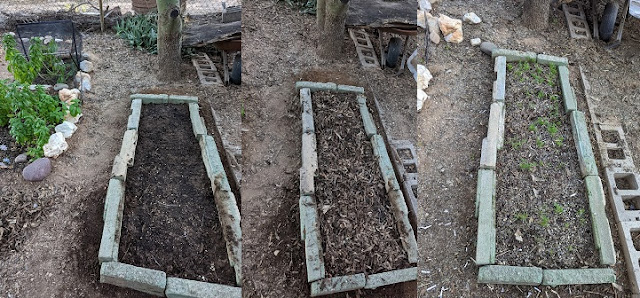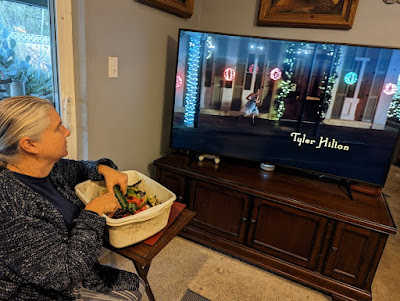 |
| I started with compost, covered it with bermuda grass clippings then planted carrot seeds |
If you've been following this blog, you may have heard me lament on how it is nearly impossible to be completely Zero Waste in our consumer culture. Our family is Reduced Waste at best. But we do try. For instance, we tote reusable grocery bags (including produce and bulk bags) and refillable water bottles.
One area where we've come closer to Zero Waste is in the garden. I don't use any store-bought fertilizer since it is packaged in plastic then shipped from far away and may even be derived from fossil fuels. I apply homemade compost topped with mulch made from organic matter that I gather from our yard (bermuda grass before it goes to seed and hollow palo verde pods) And I'm proud to say we're pretty much Zero Waste when it comes watering our garden. We didn't use any city water to irrigate our garden or landscaping this year - only rainwater! (Though we do reuse some kitchen rinse water on our compost pile.)
 |
| harvesting rainwater from our neighbor's roof for our garden |
My main reason for gardening, besides growing nutritious food, is to restore some organic matter to our desert soil. I heard at a Master Gardeners lecture that there was hardly any organic matter in Tucson. Many gardeners like to tidy up in the winter by weeding or removing the dead plants. But those so-called weeds provide many benefits to a garden including nourishing the microbes in the soil, giving food and shelter to pollinators, and sequestering carbon.
One thing I do to build soil is cut up banana peels and mix them with used tea leaves to create mulch to spread with the leaves that have fallen under our low-water fruit trees. I soak some banana peels to make a tea to add potassium more quickly. I also nourish the soil with unsalted pasta water, bean water and the water from steaming vegetables. So none of that goes to waste.
Speaking of...we are also working on preventing food waste. I collect the ends of onions, celery and carrots and cook them into a delicious broth which I store in reused mayonnaise jars.
Then I add the cooked celery and carrot scraps with other produce scraps, more banana peels, apple cores, potato peels, used coffee grounds and tea for the compost pile. We are blessed to have neighbors who leave their kitchen scraps for us on our shared wall.
And sometimes we are blessed with an over-abundance of veggies that have been saved from the landfill by Borderland's Produce on Wheels. My husband Dan is the guy riding up with his burley cart.
We do our best to use them up before they go bad. But try as we may some of it ends up in the compost pile to the delight of some very plump worms.
There are many composting methods. The easiest being just pile your nitrogen-rich kitchen scraps. green vegetation, used coffee grounds and tea leaves between layers of carbon-rich materials like brown (dried) vegetation, leaves, branches, and shredded paper. (Find a whole list of compostables here.) And keep it damp (not soaked) by spraying it with the hose. But it will take from 6 months to a year once you get a good-sized pile.
 |
| Our friend Richard by his compost mound that includes weeds but takes a year |
I'm gonna talk about the method I know - my fast composting method with worms.
I started out by piling our kitchen scraps, egg shells, used coffee grounds and tea leaves, and some dried leaves, branches, pine needles, and ripped paper and some dirt. We put up a little fence to keep the dog out. We poured our dirty dish water on it to keep it damp. But it was taking a long time - and it never really got hot enough despite exhausting efforts to stir the heavy load to get more air circulation. After over 6 months, I did have some compost at the bottom of the pile though.
I learned that there were some items that were never going to break down: like hard fruit pits, pine cones, "compostable" take-out containers, big sticks, and egg shells. I found out later that Tucson already has too much calcium in our soil, so eggshells aren't recommended. And those "compostable" containers are only compostable in a commercial facility. The avocado pits actually sprouted in the compost pile and grew leaves. I potted two for house plants. They're doing really well in their compost potting soil.
Live and learn. It was a good start, but I wanted my compost faster.
Several years back, Dan and I participated in a vermiculture workshop hosted by the UA Students for Sustainability. We even started shredding office paper to start our own system. I was thrilled when I finally got 8 worms from a farmers market. One evening I dumped them on the pile. At first, I was a little worried that birds that peck through our compost pit would gobble them all up. But I continued to tend the compost pit. I learned that worms don't like onions, citrus peels, and pine needles, so I stopped adding those. I started cutting the kitchen scraps into smaller pieces so they compost faster.
 |
| Cutting kitchen scraps into smaller pieces while watching TV |
Now I mix the scraps with used coffee grounds and shredded paper before adding it to the pile.
We keep it damp with our dirty dish water. (We use a greywater dish soap that doesn't have salt.) I needn't have worried about the birds getting all the worms. After a couple of Produce on Wheels runs, we have lots of fat and sassy worms.Now we get compost in about three weeks. But I have to sort through the worms. lol
MORE INFORMATION:
T U C S O N O R G A N I C G A R D E N E R S Home Composting in the Desert Guide
https://open.substack.com/pub/zerowastechef/p/how-to-survive-without-plastic-kitchen?r=2lbus&utm_campaign=post&utm_medium=web








Jana, I’ve gone through much of the same process with a compost pile and have pretty much given up on it. I’ll throw yard and garden debris in it but it doesn’t really decompose. What does eventually disintegrate hasn’t gone through the heating benefits of an active compost system. Now I mostly use it to regenerate used raised bed garden soil. Kitchen scraps I purée in a blender and either add directly to the garden or pour into a bucket with water to add to the garden after a day or two. I’m thinking, certainly don’t know for sure, this should oxidize the volatile oils in onions more quickly making it more acceptable to the flora and fauna of the garden soil.
ReplyDeleteThe blender method is the easiest composting solution I’ve tried. Also doesn’t give packrats a chance to use a pile as a snack bar.
Hmm...Did you add worms to your compost? That might help... I don't put onion in mine - since they don't care for the onions.
DeleteCertainly blending it will make it break down faster. Regenerating old soil is a good idea too.
What isn't breaking down?
Note: You can get local compost and mulch from Tanks Green Stuff.
ReplyDelete